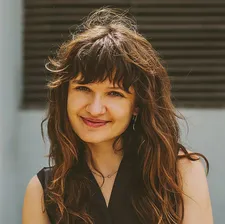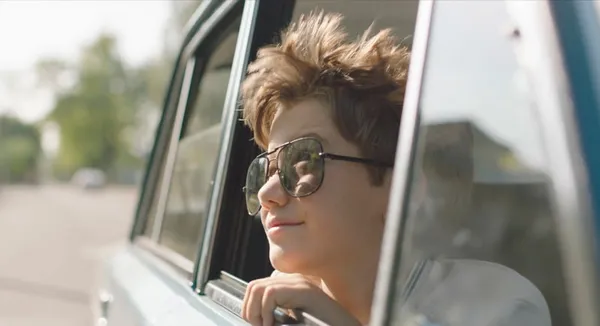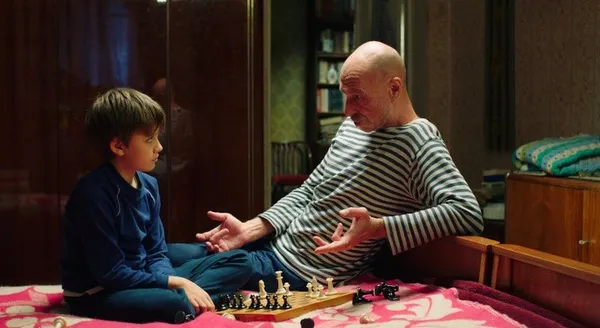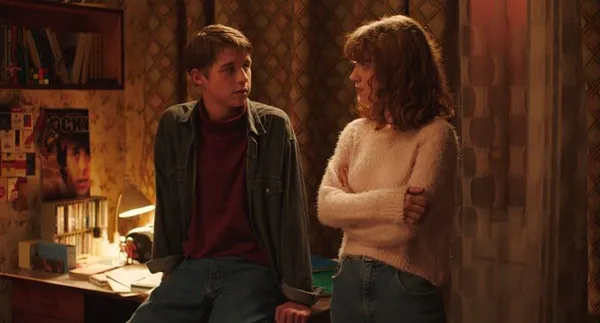Rock Paper Grenade steps back into Nineties Ukraine and the life of Tymophiy (played first by Andriy Cherednyk, then by Vladyslav Baliuk and, briefly, in adulthood, by Volodymyr Gladky). Timo, as his friends and family call him, is looking to the West in a world that is changing fast in the wake of the country’s independence from the Soviet Union and Tsylik takes a playful approach to his coming-of-age tale. It’s a world, however, that director Iryna Tsilyk shows is heavily impacted by conflict trauma, represented by Felix (Yuriy Izdryk), a mysterious Afghanistan veteran with PTSD who is in a relationship with Timo’s gran (Halyna Veretelnyk-Stephanova), much to the upset of Timo’s mum (Anastasiya Karpenko) and who strikes up an unusual friendship with the youngster.
The film, which though largely a sprightly comedy, also touches on the cyclical nature of conflict affecting Ukraine, is based on the autobiographical book by Tsilyk’s husband Artyom Chekh, who in a turn of events nobody expected when the film was being shot in 2020, is currently fighting in Ukraine after the Russian invasion earlier this year.
 |
| Rock Paper Grenade writer/director Iryna Tsilyk: 'This film was my attempt to forgive something and to say thank you to our parents for something' |
The writer/director - who has also been receiving accolades for co-writing a very different war story, Butterfly Vision - says that knowing her husband for 16 years means that his family stories have become her own. The pair of them collaborated on the script, which Tsilyk says is quite different from the original book.
She adds: “It was our attempt to build some kind of world of our childhood and teenage years, because these times, the Nineties, were very special for us and other people of our age. They were shaky post Soviet times of changes and I remember that our adults - I mean, mothers, fathers, grandmothers, etc - were really broken by all those changes, and they felt very unbalanced, and they didn't know how to deal with everything. We were kids and teenagers, and only now I am an adult and a mother, I make my own mistakes, and I have my feeling of guilt. So I can see everything with some other perspective. This film was my attempt to forgive something and to say thank you to our parents for something.”
The character of Felix is quite unusual in the film in that, like Timo, we find out very little about him beyond what he does when he is in the boy’s orbit. Clearly damaged from the Afghanistan war, not just physically, but mentally, he spends most of his time at Timo’s house drunk. But for all is oddity, he is also a source of companionship for the boy, whose wideboy father (Andrey Isaenko) is rarely home, teaching him how to play chess, showing him the rifle he kept from the war and coming up with a decidedly dodgy way of getting some cash to buy Timo a cool pair of sneakers.
“Felix was a really mysterious person,” says Tsilyk. “It's also interesting, if you remember, I used the pictures of real people in the end, but there is no single picture of him because usually his mother was the one who took pictures but she hated Felix. So we have only one image, the drawing of my husband, when he was a teenager, and he drew his friend. We don't know how his story ended and we were trying to find the information.”
“But at the same time, Felix is quite controversial too, because this is a person who was a veteran of war, he had some weapons. Now we will have the same problem in Ukraine, because so many broken people will come back. It’s a terrible truth because on the one hand, we wait for this victory, we know it will happen, we believe that, but I know that then we will have quite difficult times.
“The first years of war already showed me that these people, they come back broken, and now the scale will be different, because 1000s of veterans will try to find a connection with normal life, and it's not that easy, when you have seen death and all those trials.”
Music proves a key element of the film, not just as an escape for Felix but also as a bond that he shares with Timo. Tsilyk says some of these episodes were based on precise experiences not just from her husband’s childhood, but also from her own.
She explains: “It was a real experience. For example, this Oginski Polonaise, is well known music by a Polish composer. Felix really asked him to play it again and again and again. And my husband hated it. It was like walking in circles. But I was trying to save at least some real stories, because usually, the stories from real life have a special power. Of course, I changed a lot. For example, the beginning of the film, when Felix is drunk and dancing, that is my memory from my childhood. My father was drunk, and he was dancing, listening to Pink Floyd and I was observing him from some distance. And I really wanted to save this moment, using the tools of cinema.”
This idea of father figures being missing or more fluid than the mother figures also runs through the film, with Timo’s dad just popping home now and again, seemingly on a whim, and with trouble rarely far behind. Tsilyk says this idea is something that has interested her since she shot her previous film, acclaimed documentary The Earth Is Blue As An Orange, about the trauma of living in a warzone.
She says: “I had so many questions about the absence of men in their life. Also, I have my memories from the past about difficult, tough times and the Nineties, when men around me were mostly very lost. Women had to put everything on their shoulders, they had to be strong. And that is something about Ukrainian women. Now something has changed, because I see that not only women, but so many men woke up and they have to defend the country. And we see some real, I don't know, maybe it sounds too much, but some of them are real heroes of today. But as to the memories about my childhood, I think that is something common about many people of my age, that we mostly remember strong women and lost men from the Nineties.”
 |
| Iryna Tsylik: 'As to the memories about my childhood, I think that is something common about many people of my age, that we mostly remember strong women and lost men from the Nineties' |
It’s not just the story but the casting of the film that was close to home. Tsilyk explains that as she was preparing to pitch the film, she decided to shoot some video in support of it but didn’t have any actors, so asked her son to step into the role of the youngest incarnation of Timo, while her friend Izdryk, who is actually a well known poet in Ukraine, took on the role of Felix.
She adds: “He never had the experience of acting before. But when I was observing them, during those few days of shooting the teaser, how they were connecting, how they talked to each other, and how they felt so organic in front of the camera, I suddenly realised that it could be a very interesting decision. And it was risky, because usually, it's not that easy to work with non-professional actors but all the leading roles in this film are played by non-professionals. This is the debut for the two boys who play Timo and Izdryk.”
Speaking about her friend, she adds: “He's a very interesting personality. He's very charismatic, and he had some tough experiences in his own past. And probably my experience of making documentaries before helped me, I just allowed them to be themselves. But in terms of the characters, they were improvising a lot. I didn't ask them to say all the dialogues in a fixed way. I just asked them to improvise in some direction.”
With two of the main roles cast, finding the teenage version of Timo was a bit trickier, with the director having casting sessions with teens from across the country. She says she was drawn to Baliuk because, while many of the kids from Kyiv looked “too hipster”, he looked “the same as we looked in the Nineties”.
Her husband hasn’t been able to see the finished film yet, but Tsilyk hopes to have a screening in Kyiv soon, although she notes the situation is currently unpredictable there because the city is coming under attack. She also notes the importance of film in “building bridges between people from other worlds”.
Looking to the future, Tsilyk is continuing to tell personal stories connected to conflict, while also proving fearless when it comes to form, as she plans to explore her own trauma as the result of conflict via animation.























